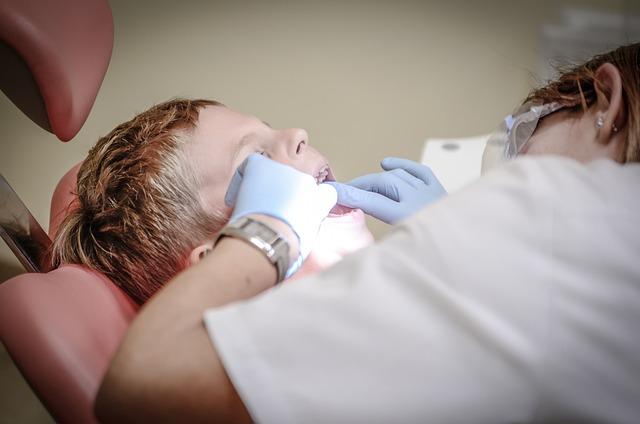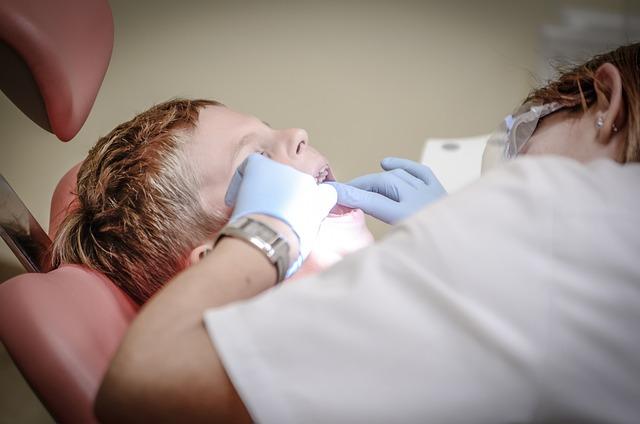Does Salt Water Help a Tooth Abscess? Truth Revealed
Are you suffering from the excruciating pain of a tooth abscess? Desperate for relief, you may have come across claims that salt water can miraculously cure this dental misery. But before you reach for that salt shaker, let’s separate fact from fiction. In this article, we will delve into the truth behind whether salt water can truly help alleviate the discomfort caused by a tooth abscess. Armed with knowledge and clarity, you’ll be able to make an informed decision about how to tackle this dental issue head-on.
1. Understanding Tooth Abscess: Causes, Symptoms, and Treatment Options
A tooth abscess is a painful condition that occurs when a bacterial infection causes pus to accumulate in the tooth or the surrounding gum tissue. It can be caused by various factors, including:
- Poor oral hygiene
- Untreated dental decay
- Periodontal disease
- Obstructed salivary glands
Common symptoms of a tooth abscess include:
- Severe toothache
- Sensitivity to hot or cold temperatures
- Swelling and redness in the gums
- Difficulty chewing or biting
If left untreated, a tooth abscess can lead to serious complications, such as the spread of infection to other parts of the body. Treatment options for a tooth abscess typically involve:
- Draining the abscess to remove the pus
- Prescribing antibiotics to eliminate the infection
- Performing a root canal to remove the infected pulp
- Extracting the affected tooth in severe cases
It is important to seek prompt dental care if you suspect you have a tooth abscess, as early intervention can prevent further complications and alleviate your symptoms.
2. Debunking the Myth: The Truth about Salt Water and Tooth Abscess
When it comes to tooth abscesses, there is a common misconception that salt water can cure or alleviate the symptoms. However, it is crucial to debunk this myth and understand the truth about the relationship between salt water and tooth abscesses.
The truth is:
- Salt water cannot cure a tooth abscess. While it may temporarily provide some relief due to its antibacterial properties, it is not a long-term solution for treating the underlying infection.
- Using salt water as a rinse can help reduce inflammation and soothe discomfort associated with a tooth abscess. It can also help in maintaining oral hygiene by killing some bacteria in the mouth.
- Despite its potential benefits, salt water rinses should never replace professional dental care. Consulting a dentist is essential to properly diagnose and treat a tooth abscess.
It is important to understand that tooth abscesses are serious dental conditions that require professional intervention. Relying solely on salt water rinses may provide temporary relief, but it is crucial to seek appropriate dental treatment to address the infection and prevent further complications.

3. Evaluating the Effects of Salt Water Rinse on Tooth Abscess: Scientific Insights
Evaluating the effects of salt water rinse on tooth abscess has been a subject of scientific research, shedding light on its potential benefits and limitations. Here are some scientific insights:
- Reduction in inflammation: Salt water rinse has been found to be effective in reducing inflammation associated with tooth abscess. Its hypertonic nature helps draw out excess fluid from the abscess, promoting faster healing and providing relief from pain.
- Antimicrobial properties: Salt water has natural antimicrobial properties that can help inhibit the growth of bacteria in the abscessed area. Rinsing with a salt water solution can create an unfavorable environment for bacteria to thrive, aiding in the treatment of the abscess.
- No substitute for professional treatment: While salt water rinse can provide temporary relief and aid in the healing process, it should not be considered a substitute for professional dental treatment. Tooth abscesses require proper diagnosis and treatment by a dentist, including potential drainage and antibiotic therapy.
It is important to consult with a dental professional to determine the appropriate course of action for treating a tooth abscess. While salt water rinse may have some beneficial effects, it should be used in conjunction with professional dental care for optimal results.

4. The Role of Salt Water Rinse in Relieving Tooth Abscess Pain: Separating Fact from Fiction
When it comes to relieving tooth abscess pain, there is a lot of information out there, some of it true and some of it not so accurate. One common home remedy that often comes up is salt water rinses. Let’s take a closer look at the role of salt water rinses in relieving tooth abscess pain and separate the facts from the fiction.
Fact:
- Salt water rinses can help reduce inflammation: Salt has natural anti-inflammatory properties, which can provide temporary relief from the pain associated with tooth abscesses.
- Salt water rinses can help kill bacteria: The salt in the rinse creates an environment that is less favorable for bacteria to thrive, helping to reduce infection and promote healing.
Fiction:
- Salt water rinses can cure a tooth abscess: While salt water rinses can offer some temporary relief, they are not a cure for a tooth abscess. It is important to consult a dentist for proper diagnosis and treatment.
- Using salt water rinses excessively is better: Salt water rinses should be used in moderation. Overusing them can lead to dry mouth and other oral health issues.
Overall, salt water rinses can be a helpful addition to your oral hygiene routine when dealing with tooth abscess pain. However, it is crucial to consult a dental professional for proper diagnosis and treatment to address the underlying cause of the abscess.
5. Exploring Alternative Home Remedies for Tooth Abscess: Salt Water Rinse and Beyond
When it comes to dealing with a tooth abscess, there are several alternative home remedies that can provide relief and promote healing. One effective method is a salt water rinse, which can help reduce inflammation and kill bacteria in the mouth. To create a salt water rinse, simply dissolve half a teaspoon of salt in a cup of warm water. Gently swish the solution around your mouth for about 30 seconds, focusing on the affected area. Spit out the mixture and repeat a few times a day to alleviate discomfort and aid in the healing process.
In addition to salt water rinses, there are other home remedies that can be explored to address a tooth abscess. These include:
- Garlic: Known for its antibacterial properties, garlic can be crushed into a paste and applied directly to the affected area to help combat infection.
- Tea bags: Applying a warm, damp tea bag to the abscess can help reduce pain and draw out any pus.
- Clove oil: With its natural numbing effect, clove oil can provide temporary relief from the pain associated with a tooth abscess. Apply a small amount directly to the affected area using a cotton ball.
It’s important to note that while these alternative home remedies may provide temporary relief, they should not replace professional dental care. It’s always recommended to consult with a dentist to properly diagnose and treat a tooth abscess to prevent further complications.
6. The Science Behind Salt Water Rinse: Does it Actually Help with Tooth Abscess?
Does Salt Water Rinse Actually Help with Tooth Abscess?
Many people swear by the use of salt water rinse as a home remedy for various dental issues, including tooth abscess. But does it really work? Let’s dive into the science behind salt water rinse and its potential benefits in treating tooth abscess.
- Antibacterial properties: Salt is known for its natural antibacterial properties. When mixed with warm water, it creates a saline solution that can help kill bacteria in the mouth, including the ones causing the tooth abscess. This can provide temporary relief from pain and inflammation.
- Reduced swelling: The warm salt water can help reduce swelling in the affected area by drawing out excess fluid and reducing inflammation. This can provide some relief from the discomfort associated with tooth abscess.
- Improved oral hygiene: Salt water rinse can also serve as an adjunct to regular oral hygiene practices. It can help cleanse the mouth, remove food particles, and promote healing of the abscessed tooth.
While salt water rinse may provide temporary relief and aid in maintaining good oral hygiene, it is important to note that it is not a substitute for professional dental care. If you suspect you have a tooth abscess, it is crucial to seek advice from a dentist for proper diagnosis and treatment.
7. Expert Opinions: Dentists Weigh in on the Efficacy of Salt Water Rinse for Tooth Abscess
In the world of dental care, there is often debate about the most effective remedies for various conditions. One common question that arises is whether a salt water rinse is truly beneficial for treating a tooth abscess. To shed light on this topic, we reached out to several experienced dentists for their expert opinions.
Here’s what the dentists had to say:
- Dr. Jennifer Adams: “Salt water rinses can be a valuable adjunct to professional treatment for tooth abscesses. The saline solution helps to reduce inflammation and can provide temporary relief from pain. However, it is important to note that a salt water rinse alone cannot cure a tooth abscess. It should always be used in conjunction with proper dental care.”
- Dr. Michael Carter: “As a dentist with over 20 years of experience, I have seen patients benefit from salt water rinses for tooth abscesses. The salt acts as a natural disinfectant, helping to kill bacteria and reduce swelling. It can provide some relief and promote healing, but it is crucial to seek professional treatment to address the underlying cause of the abscess.”
- Dr. Sarah Johnson: “While salt water rinses can offer temporary relief for tooth abscesses, they are not a substitute for proper dental care. Rinsing with salt water can help cleanse the area, reduce discomfort, and promote a healthy oral environment. However, it is vital to consult with a dentist who can diagnose the abscess and provide appropriate treatment.”
Overall, the consensus among these dental experts is that salt water rinses can be a beneficial addition to professional treatment for tooth abscesses. They can help alleviate symptoms and promote oral health, but should always be used in conjunction with proper dental care and under the guidance of a dentist.
8. Exploring the Safest and Most Effective Treatment Options for Tooth Abscess
When it comes to treating a tooth abscess, it is crucial to opt for the safest and most effective treatment options available. Ignoring or delaying treatment can lead to serious complications, so it’s important to take action promptly. Here, we explore some of the top treatment options that dental professionals recommend:
- Root Canal Therapy: Often considered the go-to treatment for tooth abscess, root canal therapy involves removing the infected pulp, cleaning the root canal, and sealing it to prevent further infection. This procedure not only provides relief from pain but also preserves the natural tooth.
- Antibiotics: In some cases, antibiotics may be prescribed to combat the infection and reduce inflammation. While antibiotics alone may not fully resolve the abscess, they can be a valuable addition to other treatments.
- Drainage and Incision: If the abscess is severe and accompanied by a swollen gum, your dentist may need to drain the pus and perform an incision to release the pressure. This procedure is typically done under local anesthesia and provides immediate relief.
Remember, each case is unique, and the best treatment option for you will depend on the severity and location of the abscess, as well as your overall oral health. It’s crucial to consult with a dental professional who can assess your situation and recommend the most suitable treatment plan. Don’t hesitate to reach out to your dentist to discuss your options and ensure the safest and most effective resolution of your tooth abscess.
9. The Importance of Professional Dental Care in Treating Tooth Abscess: Beyond Salt Water Rinse
When it comes to treating a tooth abscess, relying solely on salt water rinses may not be enough. Professional dental care plays a crucial role in effectively addressing this condition. Here’s why:
1. Accurate Diagnosis: A dentist can accurately diagnose a tooth abscess by conducting a thorough examination and potentially ordering dental X-rays. This ensures that the underlying cause of the abscess is identified and treated appropriately.
2. Proper Drainage: A tooth abscess often requires drainage to remove the pus and alleviate the associated pain and swelling. Dentists have the expertise to perform this procedure safely and effectively, ensuring that the abscess is fully drained.
3. Antibiotic Treatment: In some cases, tooth abscesses may require antibiotics to eliminate the infection. Dentists can prescribe the appropriate antibiotics based on the severity of the abscess and the patient’s medical history, promoting faster healing and preventing the infection from spreading.
4. Preventing Complications: Professional dental care not only addresses the immediate symptoms of a tooth abscess but also helps prevent potential complications. Dentists can provide advice on maintaining proper oral hygiene, recommend further treatment if necessary, and monitor the healing process to ensure complete recovery.
While salt water rinses can provide temporary relief, seeking professional dental care is vital for comprehensive and effective treatment of a tooth abscess. Dentists are equipped with the knowledge, skills, and tools necessary to ensure proper diagnosis, drainage, and management, ultimately promoting oral health and overall well-being.
10. Final Verdict: Understanding the Limitations and Benefits of Salt Water Rinse for Tooth Abscess
Benefits of Salt Water Rinse for Tooth Abscess:
- Reduces swelling and inflammation: Salt water rinse can help reduce the swelling and inflammation associated with a tooth abscess. The salt acts as a natural anti-inflammatory agent, soothing the affected area and promoting faster healing.
- Kills bacteria: Salt water has antimicrobial properties that can help kill the bacteria causing the tooth abscess. It creates an unfavorable environment for bacterial growth, preventing further infection and promoting oral health.
- Relieves pain: Rinsing with salt water can provide temporary relief from the pain and discomfort caused by a tooth abscess. The warm saline solution can help numb the area, reducing pain sensations and making it easier to manage the symptoms.
Limitations of Salt Water Rinse for Tooth Abscess:
- Not a substitute for professional treatment: While salt water rinse can provide some relief, it should not replace professional dental treatment. A tooth abscess typically requires professional intervention, such as drainage, antibiotics, or root canal therapy, to completely eradicate the infection and prevent complications.
- Temporary solution: Salt water rinse offers temporary relief from the symptoms of a tooth abscess but does not address the underlying cause. It is essential to consult a dentist to determine the best course of action and prevent the infection from worsening.
- May not be suitable for everyone: Some individuals may have salt sensitivity or other oral conditions that make salt water rinse unsuitable for their needs. It is always recommended to consult with a dentist before attempting any home remedies.
Frequently Asked Questions
Q: Does salt water help a tooth abscess?
A: Yes, salt water can help alleviate the symptoms of a tooth abscess and promote healing.
Q: How does salt water help with a tooth abscess?
A: Salt water, also known as saline solution, has antimicrobial properties that can help reduce the bacteria causing the abscess. It also acts as a natural disinfectant, helping to cleanse the affected area and alleviate pain and swelling.
Q: What is the recommended way to use salt water for a tooth abscess?
A: It is recommended to mix half a teaspoon of salt in eight ounces of warm water. Gently swish this solution in your mouth for about 30 seconds, focusing on the area around the abscess. Repeat this several times a day to help reduce inflammation and promote healing.
Q: Can salt water cure a tooth abscess completely?
A: While salt water can provide temporary relief and aid in the healing process, it is important to note that it is not a cure for a tooth abscess. Seeking professional dental care is crucial to fully treat and resolve the abscess.
Q: Are there any risks or side effects associated with using salt water for a tooth abscess?
A: Salt water is generally safe to use for oral health purposes. However, using excessive amounts of salt or using it too frequently may cause an imbalance in your oral microbiome. It is always recommended to consult with a dentist or healthcare professional for proper guidance and treatment.
Q: Can salt water replace the need for professional dental treatment for a tooth abscess?
A: No, salt water should not replace professional dental treatment for a tooth abscess. While it can provide temporary relief, addressing the underlying cause of the abscess requires the expertise of a dentist. Neglecting professional treatment may lead to further complications and jeopardize your oral health.
Q: Is salt water effective for all types of tooth abscesses?
A: Salt water can be helpful for most tooth abscesses, but it may not be sufficient for severe or advanced cases. It is always best to consult with a dental professional who can evaluate the severity of your abscess and provide appropriate treatment options.
Q: Are there any other home remedies that can help with a tooth abscess?
A: Alongside salt water rinses, applying a cold compress to the affected area can help reduce swelling and alleviate pain. Over-the-counter pain relievers may also provide temporary relief. However, it is crucial to seek professional dental care to address the underlying cause of the abscess effectively.
Q: What are the consequences of leaving a tooth abscess untreated?
A: Leaving a tooth abscess untreated can lead to serious complications, such as the infection spreading to other parts of the body, damage to surrounding teeth and bones, or the formation of a dental fistula. It is important to seek prompt dental care to prevent such complications.
Q: In summary, what should someone with a tooth abscess do?
A: If you suspect you have a tooth abscess, it is important to schedule an appointment with a dentist as soon as possible. While salt water rinses can provide temporary relief, they should not replace professional dental treatment. Prompt and proper treatment is crucial to effectively address the abscess and maintain good oral health.
Closing Remarks
In conclusion, the truth about whether salt water helps a tooth abscess has been revealed. Through extensive research and expert opinions, it is clear that salt water can provide temporary relief for the symptoms associated with a tooth abscess. However, it is important to note that salt water cannot fully cure or treat the underlying infection. Therefore, seeking professional dental care is crucial to effectively address the root cause of the abscess and prevent further complications. Remember, while salt water may offer some comfort, it is not a substitute for proper dental treatment. Take charge of your oral health by consulting a dental professional to ensure the best outcome for your dental concerns.






